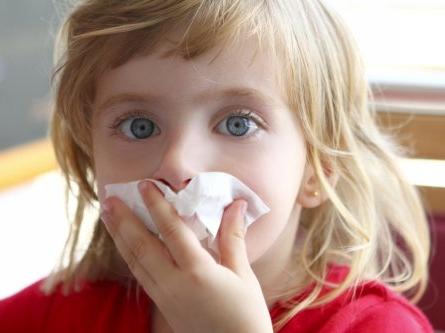When you are sick with a cold or the flu, you may have a runny nose. Why is it called a runny nose? Because of the mucus flowing and dripping from your nose.
当你患上感冒或流感,你可能会流鼻涕。为什么叫做流鼻涕,因为黏液会从你鼻子里流出或滴出来。
Yucky! But, guess what? Mucus is very helpful.
真恶心!但是,你猜怎么着?黏液是有帮助的。
Just hearing the word is enough to make some people uneasy, but science tells us that mucus is our friend. New research has found that health benefits can come from mucus and viruses.
仅仅是听到这个单词就足够让一些人不舒服了,但是科学告诉我们,黏液是我们的朋友。新的研究发现,黏液和病毒会带来一些健康益处。
Our bodies can produces more than a liter of it every day. So what is it?
我们的身体每天能产生超过一升黏液。它是什么东西呢?
"Mucus is typically a clear, gel-like substance. It is very slimy. Mucus is a secretion or substance that your body produces, and it produces it to protect itself but also to select for specific bacteria and microbes that actually help you and contributes to your immune system, and it sort of covers and coats almost the entire inside of our bodies."
“黏液是一种透明的凝胶状物质,它非常黏糊。黏液是我们身体分泌的一种物质,身体分泌黏液用来保护自己,但是它也会选定一些实际上对免疫系统有益的特定细菌或微生物,它几乎会覆盖和粘附我们整个身体内部。”

That is Jeremy Barr, adjunct professor at San Diego State University. He says that mucus is where all of your good bacteria lives and grows.
这是圣地亚哥州立大学兼职教授杰里米·巴尔(Jeremy Barr)所言。他说,黏液是有益细菌生长发育的地方。
When you have a virus, it can cause many illnesses. Barr and his fellow researchers studied a virus called "phage."
当你染上病毒可能会导致许多疾病。巴尔和他的同事研究了一种名为噬菌体的病毒。
He says this virus, when mixed with mucus cells in the body, can help protect it against bacteria.
他说当这种病毒在身体内和黏液细胞混合后,可以防止身体感染细菌。
"Phages are a special kind of virus because they only infect and kill bacteria. They don't infect humans or other animals. What our research has shown is that these phages actually stick to mucus layers all throughout your body and by sticking there they work with your body to protect and control the bacterial community that can reside or live in your mucus layers."
“噬菌体是一种特殊的病毒,它只会感染和杀死细菌,不会感染人类或其它动物。我们的研究表明,这些噬菌体粘附在身体各处的黏液层,通过这样来防控能够在黏液层生活的细菌群落。”
Mucus also helps protect your lungs from dust, bacteria, cigarette smoke, exhaust fumes and other intruders.
黏液还有助于防止肺部被灰尘、细菌、香烟的烟雾、废气和其它入侵者感染。
Barr says the interaction between mucus and phage is constant. And there are health benefits when you have a cold.
巴尔表示,黏液和噬菌体之间的互相作用是不间断的。以下是当你感冒时的健康益处。
"When you get sick, the common cold is actually a type of virus that infects our own cells and so, in that case, changes to your mucus layer could disrupt these phages or...and could sometimes lead to what we call a secondary infection. So you will actually get a bacterial pathogen that will come in and cause an infection after the common cold. We think this is a very important mechanism in your body to keep you healthy and to protect you from bacterial infection."
“当你生病时,普通感冒其实是一种病毒,它会感染我们自身的细胞。这样,身体黏液层的变化可能会干扰这些噬菌体,可能有时候会导致我们所谓的二次感染。所以在普通感冒之后,你可能会因为细菌病原体侵入而感染。我们认为黏液是保护你的健康并防止细菌感染的一项重要的身体机制。”
The group grew human lung cells in petri dishes to produce sterile mucus. They then added the phage virus. Then, they added bacteria. They found that the lung cells were better protected from bacteria than those without the added phage virus.
该小组在培养皿中培养了人类肺细胞以产生无菌黏液,然后加入噬菌体病毒,再加入细菌。他们发现,有了这些新增噬菌体病毒,肺细胞可以更好地防止被细菌入侵。
Jeremy Barr says he hopes the research will bring forth new fields of phage research, even to help prevent food-borne outbreaks like E. coli.
巴尔表示,他希望这项研究能够推动噬菌体新研究深入发展,甚至有助于防止大肠杆菌之类的食源性疾病爆发。
"So we think that if we could use these phages and how they stick to mucosal surfaces and potentially protect against some of these food-borne outbreaks."
“因此我们认为,如果我们可以利用这些噬菌体以及它们如何粘附在黏膜表面,预防一些食源性疾病的爆发。”
So the next time you have a cold, remember your mucus -- along with the phage virus -- is hard at work to make you healthy and keep those harmful bacteria away.
所以下次如果你感冒了,记得黏液正同噬菌体一起努力维持你的身体健康,并让那些有害细菌远离。
I'm Marsha James.
我是玛莎·詹姆斯。
本栏目视频字幕与文本并不完全对应,且视频播放缓冲时间较长,敬请谅解!












